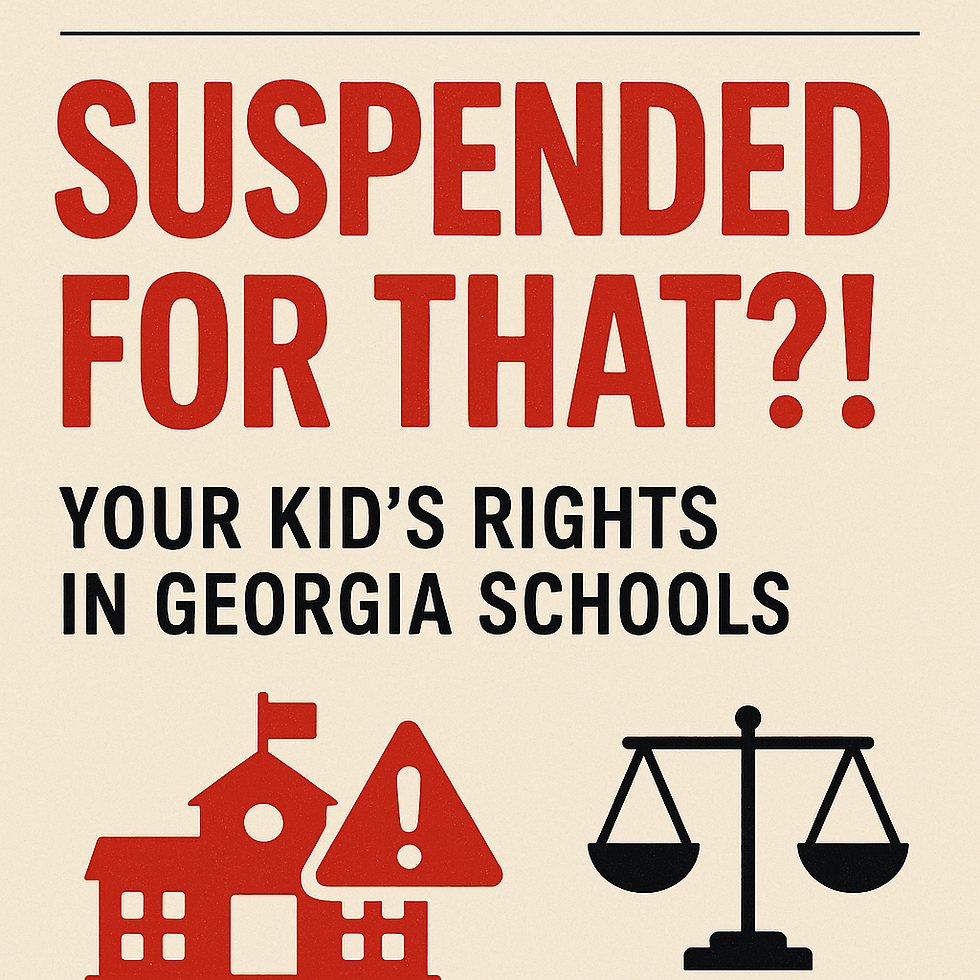“Suspended for That?! Your Kid’s Rights in Georgia Schools”
- Steph Iasiello
- Sep 29, 2025
- 3 min read

Let’s set the scene: your kid comes home and drops the bomb—“I got suspended.” You, being the overachieving millennial you are, are immediately on Google in full Nancy Drew mode, trying to figure out what happened, whether it’s legal, and if you can sue.
Welcome to the chaotic world of education law—where due process meets middle school hallway drama, and administrators forget they’re not Supreme Court justices handing down decisions with zero explanation.
Today’s post is about school discipline, especially suspensions, and how to actually challenge them under Georgia law. Whether you’re a parent, a public defender moonlighting as a school advocate, or just a nosy sibling with a legal pad, you deserve the tea.
Here’s the Problem
In Georgia, public schools have wild discretion when it comes to suspending students. The Georgia Code (OCGA § 20-2-735 and § 20-2-751.5) requires local school districts to have discipline policies in place, but “in place” doesn’t mean “transparent” or “fair” or “logical in any goddamn way.”
Many students—especially Black, Brown, disabled, and LGBTQ+ students—get suspended for vague offenses like “disruption” or “defiance” that are basically administrator code for “this kid made me feel something and I didn’t like it.”
What the Law Actually Says
Under Georgia law:
A short-term suspension (10 days or fewer) doesn’t require a formal hearing. The principal basically acts as judge, jury, and vibe-checker.
A long-term suspension or expulsion (more than 10 days) does require a disciplinary hearing with certain due process protections:
Advance notice of the charges
The right to be represented by an attorney (hi 👋)
The right to present evidence and cross-examine witnesses
A written decision afterward
But here’s the kicker: most parents don’t know they can bring a lawyer, and most kids don’t know they can say, “Nah, I didn’t do that.”
Lawyer Tip: Use the IEP or 504 Like a Sword
If your kid has an IEP or 504 Plan (special education protections), the school must hold a manifestation determination hearing within 10 days of any suspension over 10 days (consecutive OR cumulative).
This hearing decides whether the behavior was related to the child’s disability. If it was, the school can’t just yeet the kid into home suspension indefinitely. There are processes. There are rights. There are federal laws. Use them.
What You Can Actually DO
Demand the school’s Code of Conduct in writing. They legally have to give it to you. Most are online.
Write a formal letter requesting records. This includes any incident reports, camera footage, teacher statements, etc.
Insist on a disciplinary hearing (in writing).
Bring a lawyer to the hearing. Or at least a “concerned friend” with a JD and a blunt bob.
Appeal the suspension. Most school boards have an appeal process, and sometimes you can go all the way to the Georgia Board of Education.
Real Talk: The System Isn’t Built for You
Here’s the part they don’t put in the handbook: School discipline is a pipeline. And the pipeline flows straight to courtrooms like mine.
So yes, raise hell. Send emails. Show up to the hearing. Ask for the handbook citations. Bring your binder. Wear the power suit. Let them know you aren’t just a parent—you’re that parent.
Because if you don’t advocate for your kid, the system sure as hell won’t.
Don’t let a suspension derail your kid’s future. Fight back with facts, law, and just the right amount of feral rage.
🖤—The Millennial Attorney
NOTICE: The information provided on this website is for general informational and entertainment purposes only and is not intended to be legal advice. Reading these posts does not create an attorney-client relationship. Every legal situation is unique, and you should consult with a qualified attorney for advice tailored to your specific circumstances. If you need legal assistance, please contact an attorney licensed in your jurisdiction. I am a lawyer, but I'm not your lawyer.




Comments